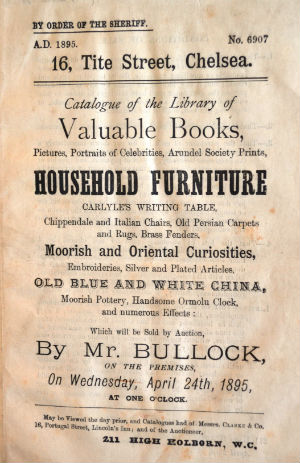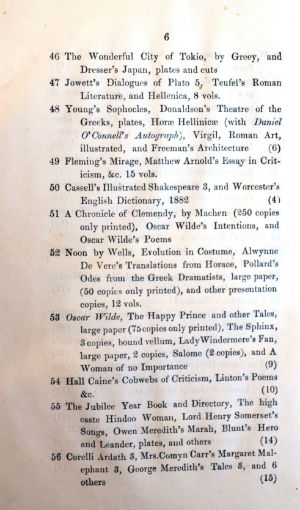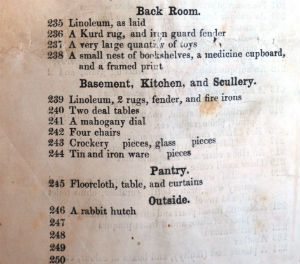Oscar Wilde’s 1895

Fig.1
This tatty sixteen page pamphlet is one of the most surprising and rare treasures of the Robert Ross Memorial collection.
One of only five known copies, the volume poignantly illustrates the extent of Oscar Wilde’s descent from the zenith of his career at the start of 1895 to his complete ruin only a few short months later. Despite no mention of Wilde’s name on the title page (Fig.1) or anywhere else in the text, this catalogue lists the contents of his family home which were sold to the highest bidder at one o’clock on Wednesday the 24th April in 1895.
Wilde’s 1895 began on a high note: An Ideal Husband premiered at the Haymarket Theatre on the 3rd of January, followed by The Importance of being Earnest at St James’s Theatre on St Valentine’s Day. Both plays met with public acclaim and, after more than a decade in the public eye, Wilde seemed to have arrived.
This was not to last, however, as on the 28th February the Marquess of Queensbury, father of Wilde’s lover, Lord Alfred Douglas, accused Wilde of “posing as a somdomite” [sic]. Wilde, perhaps ill-advisedly, took out a warrant against him for criminal libel. By the start of April, when the matter went to court, Queensbury had found witnesses who supported his claim against Wilde and he was found not guilty. The matter did not end there, however, as Queensbury’s lawyers passed their evidence on to the public prosecutor. Wilde was arrested on the 5th April and the following day charged with offences under the Criminal Law Amendment Act (1885), section XI.

Fig.2
Denied bail, Wilde was in prison awaiting trial when his creditors took possession of his house at 16 Tite Street in Chelsea. The subsequent auction of his belongings was intended to raise money to pay off Wilde’s debts, including the £677 awarded to Queensbury for legal expenses. The public humiliation of the auction must only have been intensified by the fact that the money raised (around £130) was not enough to cover Wilde’s considerable debt. Most of the lots, including copies of his own books (Fig.2), went for knock-down prices.
The variety of the lots listed in the catalogue is a sad reminder that Wilde was not alone in his sufferings in 1895. Even his small children suffered, and some of their belongings also appear in the auction catalogue (Fig.3, below): lot no. 237 is “a very large quantity of toys”, and no. 246, “a rabbit hutch.” Wilde’s wife Constance fled to Switzerland with her children Cyril and Vyvyan. She thereafter changed her children’s and her own surname to Holland, but never filed for a divorce and, indeed, visited Wilde in prison in 1895 and 1896.
The auction on Tite Street was a shambles. By the time the bidding started at one o’clock some of the lots had disappeared entirely following the unregulated viewings on the previous day. Sight-seers out-numbered serious buyers by so much that people had trouble registering their bids.

Fig.3
Unfortunately, 1895 did not improve for Oscar Wilde. He was charged with gross indecency in May of that year, and sentenced to two years hard labour which he served at Holloway Prison and Reading Gaol. Once released, Wilde’s health had deteriorated to such an extent that he died, penniless, in November 1900.
Selected bibliography
Edwards, O. D. (2012). Wilde, Oscar Fingal O’Flahertie Wills (1854-1900), writer. Oxford Dictionary of National Biography. Doi:10.1093/ref:odnb/29400
Wright, T. Oscar’s books: a journey around the library of Oscar Wilde (London, 2009).
Sotheby’s Sale Catalogue. Oscar Wilde: London, Friday 29 October 2004 (London, 2004).
Ross d.216
Published: 13 September 2014
Further selected Univ Treasures are detailed below or explore the whole collection on our News and Features Treasures pages.
